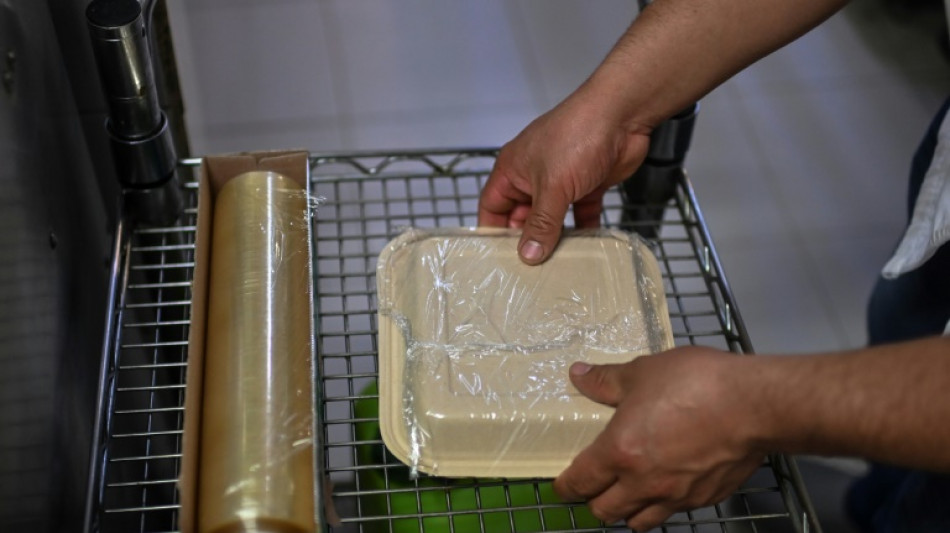
-
 Sarr strikes as Palace end winless run at Brighton
Sarr strikes as Palace end winless run at Brighton
-
Olympic star Ledecka says athletes ignored in debate over future of snowboard event

-
 Auger-Aliassime retains Montpellier Open crown
Auger-Aliassime retains Montpellier Open crown
-
Lindsey Vonn, skiing's iron lady whose Olympic dream ended in tears

-
 Conservative Thai PM claims election victory
Conservative Thai PM claims election victory
-
Kamindu fireworks rescue Sri Lanka to 163-6 against Ireland

-
 UK PM's top aide quits in scandal over Mandelson links to Epstein
UK PM's top aide quits in scandal over Mandelson links to Epstein
-
Reed continues Gulf romp with victory in Qatar

-
 Conservative Thai PM heading for election victory: projections
Conservative Thai PM heading for election victory: projections
-
Heartache for Olympic downhill champion Johnson after Vonn's crash

-
 Takaichi on course for landslide win in Japan election
Takaichi on course for landslide win in Japan election
-
Wales coach Tandy will avoid 'knee-jerk' reaction to crushing England loss

-
 Sanae Takaichi, Japan's triumphant first woman PM
Sanae Takaichi, Japan's triumphant first woman PM
-
England avoid seismic shock by beating Nepal in last-ball thriller

-
 Karl defends Olympic men's parallel giant slalom crown
Karl defends Olympic men's parallel giant slalom crown
-
Colour and caution as banned kite-flying festival returns to Pakistan

-
 England cling on to beat Nepal in last-ball thriller
England cling on to beat Nepal in last-ball thriller
-
UK foreign office to review pay-off to Epstein-linked US envoy

-
 England's Arundell eager to learn from Springbok star Kolbe
England's Arundell eager to learn from Springbok star Kolbe
-
Czech snowboard great Ledecka fails in bid for third straight Olympic gold

-
 Expectation, then stunned silence as Vonn crashes out of Olympics
Expectation, then stunned silence as Vonn crashes out of Olympics
-
Storm-battered Portugal votes in presidential election run-off

-
 Breezy Johnson wins Olympic downhill gold, Vonn crashes out
Breezy Johnson wins Olympic downhill gold, Vonn crashes out
-
Vonn's Olympic dream cut short by downhill crash

-
 French police arrest five over crypto-linked magistrate kidnapping
French police arrest five over crypto-linked magistrate kidnapping
-
Late Jacks flurry propels England to 184-7 against Nepal

-
 Vonn crashes out of Winter Olympics, ending medal dream
Vonn crashes out of Winter Olympics, ending medal dream
-
All-new Ioniq 3 coming in 2026

-
 New Twingo e-tech is at the starting line
New Twingo e-tech is at the starting line
-
New Ypsilon and Ypsilon hf

-
 The Cupra Raval will be launched in 2026
The Cupra Raval will be launched in 2026
-
New id.Polo comes electric

-
 Iran defies US threats to insist on right to enrich uranium
Iran defies US threats to insist on right to enrich uranium
-
Seifert powers New Zealand to their record T20 World Cup chase

-
 Naib's fifty lifts Afghanistan to 182-6 against New Zealand
Naib's fifty lifts Afghanistan to 182-6 against New Zealand
-
Paul Thomas Anderson wins top director prize for 'One Battle After Another'

-
 De Beers sale drags in diamond doldrums
De Beers sale drags in diamond doldrums
-
NFL embraces fashion as league seeks new audiences

-
 What's at stake for Indian agriculture in Trump's trade deal?
What's at stake for Indian agriculture in Trump's trade deal?
-
Real Madrid can wait - Siraj's dream night after late T20 call-up

-
 Castle's monster night fuels Spurs, Rockets rally to beat Thunder
Castle's monster night fuels Spurs, Rockets rally to beat Thunder
-
Japan votes in snow-hit snap polls as Takaichi eyes strong mandate

-
 Pakistan's capital picks concrete over trees, angering residents
Pakistan's capital picks concrete over trees, angering residents
-
Berlin's crumbling 'Russian houses' trapped in bureaucratic limbo

-
 Neglected killer: kala-azar disease surges in Kenya
Neglected killer: kala-azar disease surges in Kenya
-
Super Bowl set for Patriots-Seahawks showdown as politics swirl

-
 Sengun shines as Rockets rally to beat NBA champion Thunder
Sengun shines as Rockets rally to beat NBA champion Thunder
-
Matsuyama grabs PGA Phoenix Open lead with Hisatsune one back

-
 How Dental Implants Can Improve Your Quality of Life in Bonita Springs
How Dental Implants Can Improve Your Quality of Life in Bonita Springs
-
Washington Post CEO out after sweeping job cuts


Are bioplastics really the wonder alternative to petro plastics?
Alternatives to petrochemical-based plastics are emerging, made from everything from banana leaves to tomato skins, especially for food packaging.
But questions remain about how biodegradable and compostable they are, as well as their impact on the environment.
- What is biosourced plastic? -
Biosourced means made with less petrol, using non-fossil agricultural products such as sugarcane waste, corn, or wheat starch. Primarily used in packaging, these biosourced plastics account for less than one percent of global plastic production.
But labs around the world are coming up with more and more new plastics derived from tomato skins or banana leaves.
The French chemicals company Arkema, for instance, is pushing PBAT, made from castor oil, which is used to make sports shoes and car interiors.
Bananatex is a biodegradable textile made from banana leaves that has been developed by a Swiss brand and its Taiwanese partners.
However, "biosourced doesn't necessarily have to be 100 percent" from natural materials, warned Christophe Doukhi de Boissoudy, president of the French association for biosourced compostables.
In Europe, the minimum 50 percent requirement to be considered biosourced "will rise to 60 percent in January 2025", he added.
- What is a bioplastic? -
The generic term "bioplastic" can be confusing, as it can mean either biosourced or compostable: the definition varies by country.
But in Europe, the term is clearly defined -- a bioplastic is a polymer that is both biosourced and compostable, either in soil or industrially.
Not all bioplastics completely degrade under natural conditions.
Some, like PLA (polylactic acid), need to be composted industrially at temperatures between 35 and 60 degrees Centigrade (140 degrees Fahrenheit).
One of the most highly developed bioplastics currently used in textiles or for food packaging, PLA was originally fossil-based but is now being made from fermented plant biomass (corn, beet or sugarcane).
"What alarms us is the speed at which China is advancing its legislation to convert its packaging to PLA, aiming to abandon petrochemical plastics, while Europe is stagnating," said Frederic Van Gansberghe, founder of Belgium-based bioplastics company Futerro, which has a factory in China and plans to open one in France in 2026.
- What environmental impact? -
In its "Atlas of Plastic", the Heinrich Boll Foundation estimates that most biosourced plastics are neither completely biodegradable or compostable, and "actually just sidestep the problem".
For Nathalie Gontard, research director at the French National Institute for Agriculture, Food and the Environment, biosourced plastic "has absolutely no benefit" because these polymers don't degrade in natural conditions but instead fragment into micro- and then nano-plastics.
"What matters is biodegradability under natural conditions," she said.
"Biodegradable" is not well-defined, she argued, as some use it for materials that completely degrade in a few months or years, while others refer to much longer periods.
The environmental benefit of biosourced plastic lies in how they reduce the CO2 emissions of the plastics sector. But caution is needed here, experts warn.
"Additional demand for land to grow the raw materials for biosourced plastics can lead to land-use changes or deforestation," the OECD warned, which in turn can increase CO2 emissions.
"By developing bioplastics, we place the burden of manufacturing these materials on agricultural land that should primarily serve to feed the population," insisted Pauline Debrabandere from the NGO Zero Waste.
A.Mahlangu--AMWN


